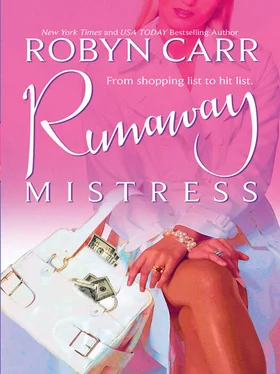The man at the end of the counter stood up and shuffled out the back door without a word, without a thank you or a goodbye.
“Is he homeless?” Jennifer asked.
“Oh my, no. He lives a couple of blocks away. Widower. We don’t see too much of him, but Buzz always reminds him that by the end of the day there’s usually food that’s going to get thrown away, if he’s interested. Once in a while, he comes down here and relieves us of the waste.” Gloria got up and cleared away the old man’s plates. “Not much of a tipper,” she laughed. And then, “You’re welcome,” she yelled toward the door.
The next couple of weeks Jennifer learned that there was much more to the diner than met the eye. More specifically, there was so much more to Buzz. His waitresses needed their jobs—jobs that seemed to be specifically designed for them. And he seemed to have a regular clientele of hungry people who needed a charitable bite to eat. Jennifer even saw Buzz tip his flask over a cup of coffee a transient was having.
“Did I see you just give that man a drink?”
“Appeared he needed one,” Buzz said, clearly not interested in discussing it.
And then she realized that Buzz had his own little meals-on-wheels service. He frequently excused himself from the diner for just a few minutes with a take-out carton in a grocery-store sack. Or he’d ask Adolfo or Hedda if they’d drop something by Miss Simms’s or Mr. Haddock’s place as they were leaving. It didn’t appear to be a scheduled service, unless he had a schedule in his head. Buzz seemed to know when and where to fill a need.
Saturday morning, around nine, found the diner packed to capacity and Hedda was serving up a storm. Jennifer was getting the hang of this waiting business, but she was nothing compared to Hedda in speed and accuracy. “Don’t worry about it,” Hedda told her. “You’re doing great, and I can back you up.”
Hedda was picking up orders from the grill and switched the radio station to something with a little more boogy to it. “Oh, Mother Mary,” Buzz complained.
A song by Usher blasted into the little diner and Hedda said, “Oh, yeah!”
Balancing two complete breakfasts on her arm and a coffeepot in her hand, she two-stepped across the floor in her high-top, rubber-toed athletic shoes to the rhythm of the hip-hop. She put them on the table with a flourish, poured the coffee in spurts that matched the beat, then hopped away from the table on her way back to the counter.
Someone in the diner began to tap on a tabletop to the beat while someone else clinked a utensil against a saucer. Encouraged, Hedda continued to dance around the diner while she picked up plates. It was irresistible to Jennifer, who had always loved to dance. She joined in, moving to the beat as she went from table to booth to table, picking up dishes, then hopped backward and around in a circle just as Hedda had done. They met in the middle, bumped rumps, did a few hops and high-fived each other. There was a bit of laughter and the tapping turned to table banging, which only served as encouragement.
As the waitresses hopped and slid and wriggled around the diner, the patrons kept the beat with enthusiasm. The song was a mere three minutes long, and when it came to an end they took a bow and erupted into laughter. There was a little applause from their tiny gallery. “You’re all right, Doris,” Hedda said. And she whispered, “Think any of these tightwads will cough up an extra dollar?”
At the end of the shift they pooled their tips and divided them. It had been a good morning; Hedda’s face lit up as she pocketed sixty dollars. “Yeah, I think I might go to that prom. My boyfriend, Max, thinks he can borrow his older brother’s car for the night.”
“Here,” Jennifer said, handing her another twenty. “You did twice the work I did.”
“No way,” she refused. “A deal’s a deal. Besides, it was busier than usual. And I think that little hip-hop brought us in a little extra.”
“It was a nice break from la orquesta,” Jennifer laughed.
“Hedda,” a woman called sharply.
Both waitresses turned to see Hedda’s mother standing in the diner door with her seven-year-old boy by the hand. Jennifer wouldn’t have recognized her by the way she looked—her appearance was so much improved from the other day in the doorway of the bungalow. But the sharp tone of her voice was unmistakable. Jennifer was a little startled to see that up close the woman was about her own age, give or take a year. She must have had Hedda as a teenager. She was dressed and made up for work, an old trench coat obviously covering a sexy waitress uniform that included black hose and heels. She was, in fact, an attractive blonde, though a little on the pale side. She would definitely be prettier if she had a smile on her face instead of an expression of sheer annoyance.
“Did you forget something?” she asked.
“I was just on my way, Mama. Mama, meet Doris—a new waitress here. Doris, this is my mom, Sylvia.”
“Hello,” Sylvia said shortly. “Hedda, you’re going to make me late by screwing around.”
“Sorry, Mama. Just let me get Joey a soda and then I’ll take him home.” Hedda crouched. “How’d you like that, skipper? Cherry Coke?”
“Yeah!” he said, climbing up on a stool.
“Hedda, I have to talk to you for a minute,” Sylvia said. She turned around and headed out the door.
“I’ll get that Coke,” Jennifer said. “Nice meeting you,” she called after the woman.
Sylvia turned and gave a nod, but she was all about business. Late for work, Jennifer decided. She watched through the front window while Hedda and her mom talked for a moment and then Hedda reached into her pocket, withdrew her tip money and peeled off two twenties, handing them to her mom. Then, as Sylvia’s hand remained extended, Hedda put out all she had.
Jennifer felt her heart twist. She hoped she would see Sylvia give her daughter a kiss or hug or some show of affection—at least a smile—but when Sylvia just walked away, Jennifer’s twisted heart sank.
Hedda stayed outside awhile after her mother left, staring in the direction of her departure. When she came back inside, she was quieter. To her credit she kept her chin up. And she didn’t say a thing about giving her mother money.
There was a coin-operated washer and dryer at the Sunset Motel, so Jennifer put on her sweat suit, the first purchase she had made after fleeing the MGM Grand, and washed her clothing and sheets. Nothing in her life felt more like luxury—even in her Fort Lauderdale condo—than clean sheets. These sheets were a little on the muslin side rather than the nice six-hundred-count at home, but it was the clean smell that counted.
In bed, cozied up to the smell of Downy, ready for a guiltless sleep, she heard the sounds of a neighborhood that was still awake through the thin walls. Someone played a radio too loudly and young peoples’ voices could be heard from another block. There were the occasional horns honking, engines revving and the unmistakable sound of a skateboard whizzing past her room.
What am I doing here? she asked herself for the millionth time. Of all the things she had considered for her future, her imagination had never ventured this far. She had thought about a career in real estate, or maybe even a travel agency.
She wasn’t missing her sexy clothes, nor did she lament frequent trips to fancy spas or resorts. She hadn’t wanted to be the other woman for life and, in fact, the sooner she could leave all that behind, the better. But one thing she had never seen coming was what appeared to be a return to the tough times of her youth.
It had been almost four weeks, and the time had flown by. She appeared to have been left alone by Nick, though he rarely left her thoughts. Every day she expected to see his chauffeured car drive slowly past the diner, but as the time passed she was left to assume he was back in Florida, probably searching for her there, where all her personal belongings were. As for Nevada, had he left the search to the local police?
Читать дальше












